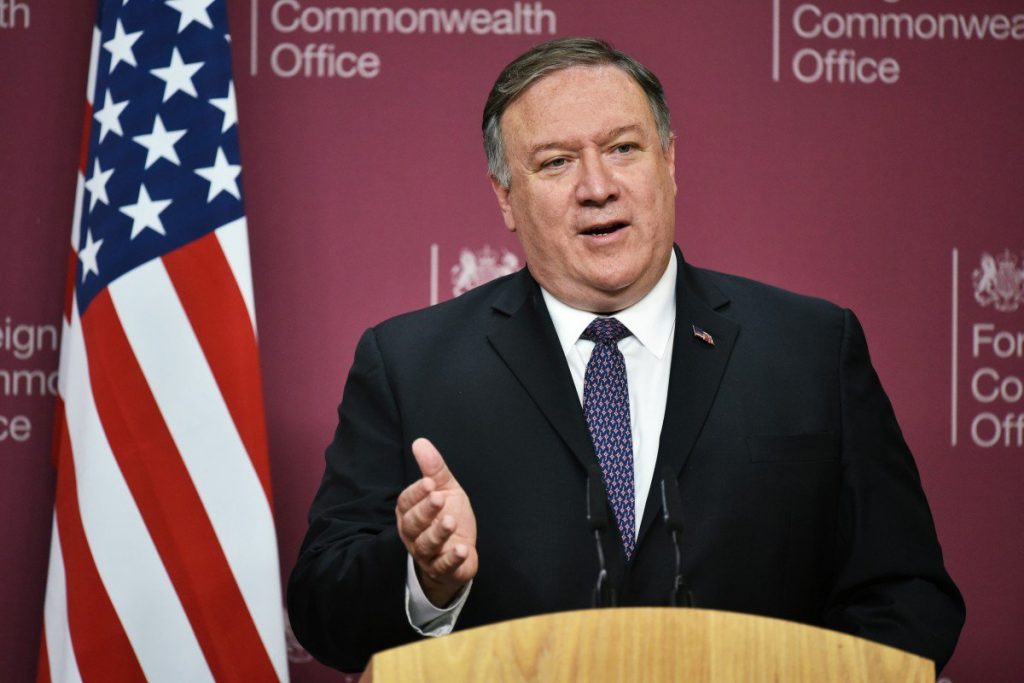Washington: The US will end the last remaining sanctions waiver that allowed countries like China to cooperate with Iran on civil nuclear projects under the landmark 2015 Iran nuclear deal, Secretary of State Mike Pompeo has announced.
European nations and other parties to the nuclear deal, including Russia and China, have continued to work with Iran within the framework of the 2015 pact, which eased economic sanctions on Tehran in exchange for limits on its nuclear programme. The waivers allowed companies from these countries to work with Iran on civil nuclear projects.
The waivers were last renewed at the end of March and are due to expire at the end of the week.
Pompeo announced on Wednesday that the waivers will end following a 60-day wind-down period that is meant to allow businesses to cease operations.
“Today, I am announcing the end of the sanctions waiver covering all remaining JCPOA-originating nuclear projects in Iran — the Arak reactor conversion, the provision of enriched uranium for the Tehran Research Reactor, and the export of Iran’s spent and scrap research reactor fuel,” Pompeo said.
The announcement virtually ends the Iranian nuclear deal, which was a key foreign policy accomplishment of the previous Obama Administration.
President Donald Trump withdrew from the nuclear deal in 2018 and has steadily reimposed US sanctions on Iran that had been eased or lifted under its terms.
Pompeo alleged that the Iranian regime has continued its nuclear brinkmanship by expanding proliferation sensitive activities.
“These escalatory actions are unacceptable and I cannot justify renewing the waiver for these JCPOA-related activities as a result,” he said, adding that the regime’s nuclear extortion will lead to increased pressure on Iran and further isolate the regime from the international community.
“Moreover, Iran’s nuclear personnel need to make a choice – work for Iranian proliferation organisations and risk being sanctioned or put their skills to work for the Iranian people in pursuits outside of the proliferation realm,” he said.
As the waiver covering JCPOA-related activities comes to an end, the United States is providing a 90-day extension for the waiver covering ongoing international support to the Bushehr Nuclear Power Plant Unit 1 to ensure safety of operations.
“We will continue to closely monitor all developments in Iran’s nuclear programme and can modify this waiver at any time,” he said.
Pompeo also announced the designation of Majid Agha’i and Amjad Sazgar for engaging or attempting to engage in activities that have materially contributed to, or pose a risk of materially contributing to, the proliferation of weapons of mass destruction.
Sazgar is the Managing Director of the Atomic Energy Organisation of Iran entity responsible for the industrial-scale production of uranium enrichment gas centrifuge machines.
In 2019, Sazgar managed and supervised the installation of centrifuges at Iran’s Fordow Fuel Enrichment plant. Through these activities, Sazgar has contributed to Iran’s continued provocative and destabilising expansion of its nuclear capabilities.
Agha’i has also been centrally involved in Iran’s uranium enrichment centrifuge operations, and is a manager in the Atomic Energy Organisation of Iran subsidiary responsible for research and development of advanced centrifuges.
Later Special US Representative on Iran, Brian Hook said that the US is taking these actions now because the regime continues to use its nuclear programme to extort the international community.
“The Iranian regime’s threats are designed to intimidate nations into accepting Iran’s usual violent behaviour for fear of something worse. We refuse to play by Iran’s rules,” he told reporters in a conference call.
President Donald Trump’s maximum pressure campaign has constrained and countered Iran in unprecedented ways.
“We have deprived the clerical rulers of vast amounts of revenue. We have disrupted their financial networks and their sectarian networks. Because of our pressure, Iran’s leaders are facing a decision: either negotiate with us or manage economic collapse,” he said.
Hook said that Iran’s economy is especially grim because the autocratic rule of the ayatollahs has proven to be an economic catastrophe for the Iranian people.
Exports are down, the economy is in deep contraction, the budget – the government budget is facing unprecedented pressures it cannot fix, and access to foreign reserves is minimal. The United States will continue its successful strategy of maximum economic pressure and diplomatic isolation, he asserted.
The US, he said, will deny Iran all paths to a nuclear weapon.
PTI
